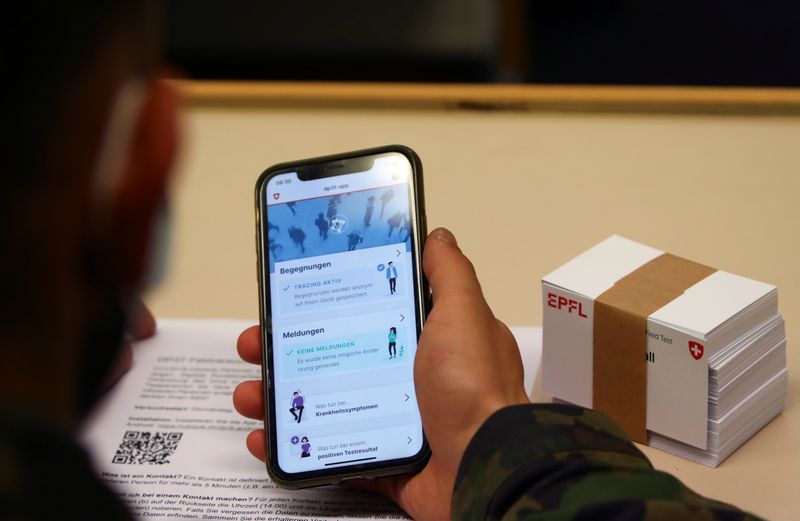By Douglas Busvine
BERLIN (Reuters) - A European coalition is forming around an approach to using smartphone technology to trace coronavirus infections that, its backers hope, could help to reopen borders without unleashing a second wave of the pandemic.
As countries rush to develop apps that would use Bluetooth short-range wireless to identify those who have come into contact with people infected with the virus, controversy has erupted over how best to handle the personal data they collect.
Britain and France argue people should trust their health authorities to hold such information on a central computer server. A loose coalition of other nations, led by Switzerland and including Germany and Italy, believe data should be kept only on handsets so that it would be impossible for governments to spy on their citizens.
Crucially for the coalition, its approach is compatible with that of U.S. technology giants Apple (O:AAPL) and Alphabet's (O:GOOGL) Google, whose iOS and Android operating systems run 99% of the world's smartphones.
Apple has, on privacy grounds, erected a roadblock to centralized apps by preventing the Bluetooth Low Energy function on its iPhones from monitoring other devices while running in the background.
That means for such apps to work, they would need to be open while the phone is unlocked - a pain for the user and a drain on the battery. Attempted workarounds have proven to be unreliable.
Supporters of the phone-based approach from Austria, Estonia, Finland, Germany, Italy, Portugal and Switzerland this week backed a roadmap view to enable national apps to 'talk' to each other and handle infections when people travel abroad.
"Everything about these projects has from Day One been about how we can make it work on an international level," said Marcel Salathe, a digital epidemiologist at the Swiss Federal Institute of Technology in Lausanne.
INTERNATIONAL DEBATE
The standards row has been compared by German Health Minister Jens Spahn to a "war of religion". It also has major ramifications for Europe, a patchwork of over 40 nations where lockdowns have brought cross-border travel to a near standstill.
It is also playing out in other parts of the world.
Colombia has removed the contact-tracing feature in its official app for informing residents about the coronavirus after experiencing glitches, but aims to rebuild using the Apple-Google technology.
In Europe, Salathe is a leading voice in an initiative called DP-3T https://github.com/DP-3T/documents/blob/master/DP3T%20White%20Paper.pdf that has brought together Swiss and other European researchers to develop a decentralized app whose guiding principle is that it should be trusted by the public and not limited to one geography.
"Interoperability of proximity tracing apps across borders is crucial," said Cas Cremers of the CISPA cybersecurity institute, brought to advise on Germany's app plan after Berlin recently switched to the 'decentralized' camp.
Of the European coalition, only Austria has so far rolled out an app. Stopp Corona, developed by Accenture (NYSE:ACN) for the Red Cross, has been downloaded 570,000 times and is being tweaked to run on a decentralized architecture.
A Swiss prototype has undergone trials with army volunteers to see whether it can detect close encounters lasting more than five minutes - a risk event that would trigger a push notification to call a doctor or self-isolate.
SIGN UP OR ELSE
Researchers at Oxford University say that 60% of people need to sign up to apps to achieve the tracing levels needed to help defeat COVID-19.
Although such apps can be useful at lower levels of takeup, this has led some governments that have already launched them, including Australia, to link further steps to ease lockdowns to the number of downloads.
That approach is anathema to the decentralizers and privacy advocates. They say any discrimination -- for example making access to a workplace contingent on using an app -- should be illegal.
Adopting proximity tracing apps should be seen as an act of altruism to help protect others from infection, argues Carmela Troncoso, a computer scientist at Lausanne who has been involved in designing and coding DP-3T.
Troncoso acknowledged that defending privacy entailed trade-offs in terms of utility when compared to the intrusive surveillance used by China and South Korea to trace and chase infections. That, however, is the point.
"This is a very big bet: We hope this will allow us to better control the spread of the virus so that we can go back to normal life," Troncoso told Reuters.

"But it's very hard to say that it will work. All the more reason not to create a new, invasive technology."